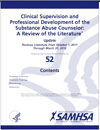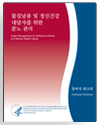|
|
What's new
|
 TIP 48 TIP 48
Managing Depressive Symptoms in Substance Abuse Clients During Early Recovery: A Review of the Literature
This Literature Review Update includes latest related findings published between January 1, 2012 and June 30, 2012.
Click here for the TIP 48 Literature review page.
|
|
 Behavioral Health Issues Among Afghanistan and Iraq U.S. War Veterans Behavioral Health Issues Among Afghanistan and Iraq U.S. War Veterans
This In Brief provides an introduction to the behavioral health problems facing Operation Enduring Freedom and Operation Iraqi Freedom veterans and can help healthcare and social service professionals understand veterans’ needs.
Click here for the Veterans In Brief. |
 TIP 53 TIP 53
Addressing Viral Hepatitis in People With Substance Use Disorders: A Review of the Literature
This Literature Review Update includes latest related findings published between November 1,
2011 and April 30, 2012.
Click here for the TIP 53 Literature review page. |
 TIP 48 TIP 48
Managing Depressive Symptoms in Substance Abuse Clients During Early Recovery: A Review of the Literature
This Literature Review Update includes latest related findings published between July 1, 2011 and December 31, 2011.
Click here for the TIP 48 Literature review page. |
 TIP 41 TIP 41
Substance Abuse Treatment: Group Therapy Inservice Training provides seven scripted modules to assist treatment program staff in understanding and implementing evidence-based group therapy practices. It is based on Treatment Improvement Protocol (TIP) 41, Substance Abuse Treatment: Group Therapy. The training curriculum is available in electronic format only.
Click here for the TIP 41 Inservice Training. |
|
 TIP 49 TIP 49
Incorporating Alcohol Pharmacotherapies
Into Medical Practice: A Review of the Literature
This Literature Review Update includes latest related findings published between July 1, 2011, and January 31, 2012.
Click here for the Tip 49 Literature review page. |
|
 TIP 50 TIP 50
Addressing Suicidal Thoughts
and Behaviors in Substance
Abuse Treatment: A Review of the Literature
This Literature Review Update includes latest related findings published between January 1, 2012, and March 31, 2012.
Click here for the Tip 50 Literature review page. |
|
 TIP 52 TIP 52
Clinical Supervision and
Professional Development of the Substance Abuse Counselor: A Review of the Literature
This Literature Review Update includes latest related findings published between October 1, 2011, and March 31, 2012.
Click here for the Tip 52 Literature review page. |
|
 TIP 54 TIP 54
Managing Chronic Pain in
Adults With or in Recovery From
Substance Use Disorders:
A Review of the Literature
This Literature Review Update includes latest related findings published between October 1,
2011 and May 32, 2012.
Click here for the Tip 54 Literature review page. |
|
 Families in Recovery: A family education video to accompany the Counselor's Family Education Manual: Matrix Intensive Outpatient Treatment for People With Stimulant Use Disorders Families in Recovery: A family education video to accompany the Counselor's Family Education Manual: Matrix Intensive Outpatient Treatment for People With Stimulant Use Disorders
This video includes interviews of people in recovery and their loved ones and provides key information for those supporting people in substance abuse treatment and recovery. It presents ways family members can support loved ones during treatment and early recovery. Because the people in the video are in recovery themselves or are family members of people in recovery, listening to their experiences may help others understand the role of family in recovery.
Click here to watch the Families in Recovery Video.
Click here for the Families in Recovery manuals and video section. |
|
 Triggers and Cravings: A family education video to accompany the Counselor's Family Education Manual: Matrix Intensive Outpatient Treatment for People With Stimulant Use Disorders Triggers and Cravings: A family education video to accompany the Counselor's Family Education Manual: Matrix Intensive Outpatient Treatment for People With Stimulant Use Disorders
This video includes interviews of people in recovery and their loved ones and provides key information for those supporting people in substance abuse treatment and recovery. It introduces information about the concept of the disease of addiction, the changes to the brain of a person who abuses substances, and the physical and psychological reactions when substance abuse stops. The video explains cravings, why they occur, and ways they can be handled.
Click here to watch the Triggers and Cravings video.
Click here for the Triggers and Cravings manuals and video section |
|
 Roadmap for Recovery: A family education video to accompany the Counselor's Family Education Manual: Matrix Intensive Outpatient Treatment for People With Stimulant Use Disorders Roadmap for Recovery: A family education video to accompany the Counselor's Family Education Manual: Matrix Intensive Outpatient Treatment for People With Stimulant Use Disorders
This video includes interviews of people in recovery and their loved ones and provides key information for those supporting people in substance abuse treatment and recovery. It presents the four stages of recovery—withdrawal, early abstinence, protracted abstinence, and adjustment and resolution. It explains what people in recovery and their families, friends, and loved ones can do during each stage to make the journey more successful.
Click here to watch the Roadmap for Recovery videos.
Click here for the Roadmap for Recovery manuals and video section. |
|
 TAP 32, Clinical Drug Testing in Primary Care TAP 32, Clinical Drug Testing in Primary Care
This TAP is for clinical practitioners who provide primary care in office settings and community health centers. The publication provides information that practitioners need when deciding whether to introduce drug testing in their practices, and gives guidance on implementing drug testing.
Click here for TAP 32.
|
|
 Anger Management for Substance Abuse and Mental Health Clients: A Cognitive Behavioral Therapy Manual Anger Management for Substance Abuse and Mental Health Clients: A Cognitive Behavioral Therapy Manual
This manual is now available in Korean. This manual helps counselors teach anger management techniques in a group setting through a 12-week cognitive behavioral intervention (participants use the accompanying workbook, see below). It describes the anger cycle, conflict resolution, assertiveness skills, and anger control plans.
Click here for the Anger Management Manual in Korean. |
|
 Anger Management for Substance Abuse and Mental Health Clients: Participant Workbook Anger Management for Substance Abuse and Mental Health Clients: Participant Workbook
This workbook is now available in Korean. It provides worksheets and homework assignments using the core concepts of the 12-week group cognitive behavioral therapy provided in the accompanying manual.
Click here for the Anger Management Participant Workbook in Korean.
|
|
 The Role of Biomarkers in the Treatment of Alcohol Use Disorders, 2012 Revision The Role of Biomarkers in the Treatment of Alcohol Use Disorders, 2012 Revision
This Advisory is a revision of the 2006 Substance Abuse Treatment Advisory, The Role of Biomarkers in the Treatment of Alcohol Use Disorders. Biomarkers are physiological signs of alcohol exposure or ingestion and may indicate a person has an alcohol use disorder. The Advisory reviews recent scientific information about biomarkers and discusses their relevance for clinical and medical purposes. In addition, it presents information about the use of biomarkers in treatment, their limitations, and the positive and negative aspects of each biomarker.
Click here for The Role of Biomarkers Advisory. |
|
 An Introduction to Extended-Release Injectable Naltrexone for the Treatment of People With Opioid Dependence An Introduction to Extended-Release Injectable Naltrexone for the Treatment of People With Opioid Dependence
This Advisory provides a brief introduction to extended-release injectable naltrexone as a treatment for opioid dependence. It is a long-acting pharmacological treatment option that is available in healthcare settings where agonist treatments may not be available and for people with opioid dependence who have not succeeded with or prefer not to take methadone or buprenorphine.
Click here for The Extended-Release Injectable Naltrexone Advisory. |
|
 TIP 53: Addressing Viral Hepatitis in People With Substance Use Disorders TIP 53: Addressing Viral Hepatitis in People With Substance Use Disorders
This TIP will enable behavioral health professionals who provide substance abuse treatment to: understand the implications of a diagnosis of hepatitis; educate, counsel, and support clients and their families; evaluate a program’s hepatitis information and practices; implement hepatitis screening; educate healthcare professionals about substance use disorder treatment in relation to hepatitis prevention and treatment; and establish cross-referral, consultation, and reporting networks with other healthcare providers.
Click here for TIP 53. |
|
 TIP 54: Managing Chronic Pain in Adults With or in Recovery From Substance Use Disorders TIP 54: Managing Chronic Pain in Adults With or in Recovery From Substance Use Disorders
This TIP is for primary care providers who treat adult patients with or in recovery from substance use disorders (SUDs) who have chronic noncancer pain (CNCP). It provides readers with information about assessing patients with CNCP, screening patients for SUDs, managing addiction risk, monitoring patient adherence to treatment, and making referrals for further evaluation. Topics also include treating CNCP in patients on medication-assisted recovery, treating patients with active addiction, and treating patients with other behavioral health issues.
Click here for TIP 54. |
|
Easy ways to get your
free copies:
| 1. |
Call us at:
Toll Free: 1-800-729-6686
Hablamos Español: 1-877-767-8432
Local Callers: 240-221-4017
TDD: 1-800-487-4889
Fax: 240-221-4292
|
| 2. |
Download a copy from the
KAP Web site
|
Click
here for the products page.
|
|
|
Page Last Updated:
Friday, October 19, 2012
|
|
